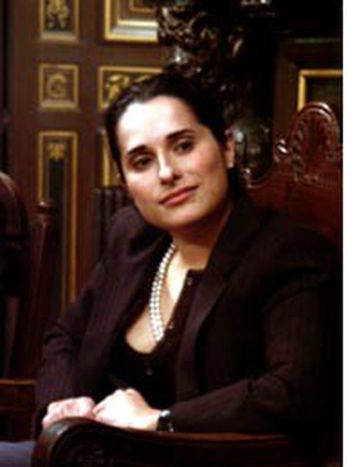
Cristina Branco, the magic of fado
Published on
If you haven’t heard of Cristina Branco it’s likely that you haven’t heard of fado, a melancholy Portuguese singing tradition which is set to take Europe by storm
I meet Cristina Branco at the Portuguese Consulate in Paris where she is holding an intimate audience to promote her new album, Ulisses. The consulate is an impressive, Haussmannian building and its heavy, wood-panelled interior décor makes an interesting setting for an informal face-to-face with Cristina Branco. Arriving a little behind schedule, the petite brunette is extremely courteous, if a little on the timid side. Flanked by her French producer and the Portuguese Consul-General João Teotónio Pereira, Branco seems almost lost in the large carved wooden chair she was shown to. Considering she wanted to become a journalist, I start by asking her why she gave up her studies to become a performer: 'I find it easier talking to journalists than being one!' she quips.
Although her musical style is particularly anchored in Portuguese tradition, the fact remains that Cristina’s albums have reached triple platinum in Holland, where she has her biggest fan base. How did it happen that the land of windmills fell for her talents? 'The first time I went on stage was in Holland, but it was completely by accident,' she smiles. 'A friend in Portugal persuaded me to appear on his television programme. Someone in Holland saw the programme and invited me there to perform. Before that I only sang in the bathroom!' That performance resulted in her first album, Cristina Branco in Holland and was followed the next year by Murmúrio, which won the Choc de l’Année du Monde de la Musique, a prestigious French award.
Branco sings in four languages (Portuguese, English, French and Dutch) and sees her music as having no linguistic barriers: 'Words are not always the most important part of a song. Understanding doesn’t always arrive through words.' She goes on to say, however, that it pleases her that 'there are many Americans, Japanese, Dutch and others who are learning Portuguese through fado.' Given that she sings in many languages and spends a lot of time travelling abroad, I asked her if she still feels attached to her country. 'I am Portuguese,' she says emphatically. 'I am very patriotic.'
But despite this assertion, Branco is not a traditional fadista who conforms rigidly to the historical roots of the genre. She has introduced modern elements to her music, including using lyrics by foreign poets such as Paul Eluard which she reconciles with fado by 'looking for the musicality in words, their mysticism. The album Ulisses is an example of this duality between traditional Portuguese music and poems from beyond Portugal that express the emotion of the music.' Even more unusually, Branco has collaborated with a Dutch rock group - they sang in their native language and style, while she provided a refrain in fado style - and claims to have been influenced by authors as varied as James Joyce, Hemingway and Patrick Suskind. She continues, 'I also enjoy reading Socrates, Sartre, Nietzsche – he’s sublime!'
Branco’s duality is perhaps a reflection of a modern Portugal, which has had to marry tradition and modernity since its accession to the EEC (as it was then) in 1986. While she does not want to be drawn into a political discussion, I got a glimpse of her conflicting sentiments about Portugal’s modernisation. 'Portugal has changed enormously,' but having been born just before the revolution in 1974, she appreciates that: 'you have to grab freedom with both hands.' Although she insists she feels Portuguese, Europe is her playground, and when asked if she has a desire to settle down anywhere in particular, she is non-committal. 'My son (with Custódio Castelo, her guitarist and husband - ed) is in Portugal, and he is my inspiration. Usually he travels with me, but he is not feeling well this time.'
Just before leaving, I ask her one final question: now that fado is having a mini-revival, is there anyone in the music world she would like to collaborate with? Her modesty is all too apparent at this point: 'I wouldn’t have the courage to ask anyone I admired to sing with me.' When pressed to name even one person she would love to work with, even if she thinks it might never happen, she eventually comes out with Elvis Costello, at which point her producer chimes in. 'Well, he is on the same record label as you in France. Maybe we could arrange it!' Branco’s response embodies the spirit of many Europeans today. On the one hand, she has a very strong national identity that manifests itself in her love for this traditional Portuguese music. On the other hand, influences from other European singers, writers, poets and artists have impacted on her interpretation of fado, and pushed her to assimilate this cultural exchange.



